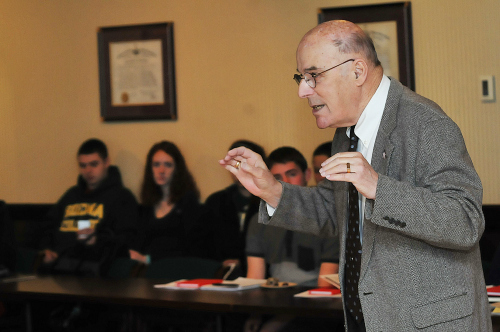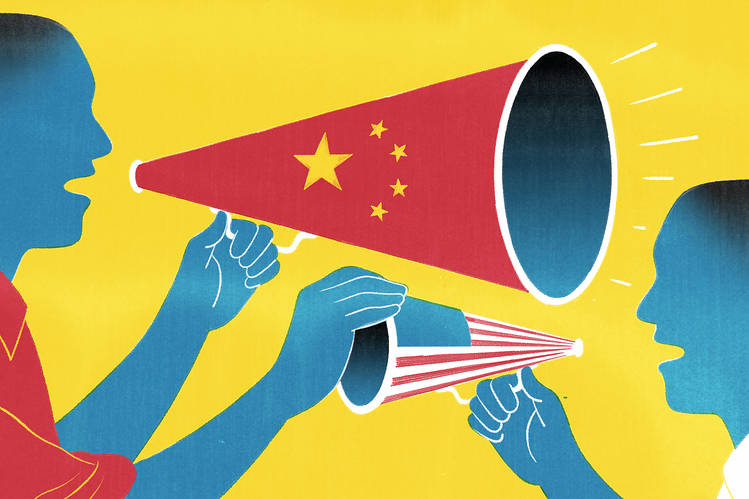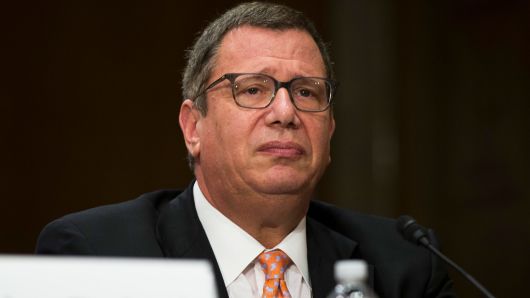Russia Today: Our Most Urgent Foreign Policy Challenge (December 22, 2018)
By Ambassador Robert Gosende*
Image from, under the headline: Ambassador Robert Gosende Speaks at Siena Symposium
I recently had the opportunity to be in Russia, Moscow and St. Petersburg, for one week participating in the 7th Annual St. Petersburg Cultural Forum. I was invited to participate in the Forum by the Dance and Ballet section which asked me to describe the importance that I attached to the decision by the U.S. and U.S.S.R. governments to support contact in the Arts during the Cold War. I was happy to do this since I participated in such activities during my career as a diplomat in the U.S. Information Agency [JB - see].
This unexpected return to Russia brought my wife and me back after a long hiatus. Much has changed since we last were assigned there 20 years ago. Moscow and St. Petersburg, each always very beautiful cities, have been completely restored. The city-center streets are in perfect shape. Buildings are once again beautiful and great skill has been exercised, espe..
Countering Disinformation: The Public Diplomacy Problem of Our Time
As scholars and practitioners of public diplomacy, we are interested in how governments, groups and individuals work together to achieve common goals. We expect...
China Gets Its Message to Americans but Doesn’t Want to Reciprocate
Orville Schell and Larry Diamond, The Wall Street Journal, Dec. 21, 2018 10:51 a.m. ET
uncaptioned image from article
President Donald Trump insists that China has been ripping off America for decades, but even if the two countries manage to negotiate—and honor—new terms for trade, basic reciprocity will still be sorely lacking elsewhere in the relationship and will continue to create tensions.
Consider the stark imbalance in media access. In the U.S., Beijing has established both a radio network and a television network, which distribute state-controlled programming to American audiences. China also publishes newspapers and magazines here in Chinese and English, Chinese websites are available to Americans online, and the U.S. readily gives work visas to Chinese reporters, who then feed content back to state-run propaganda organs at home.
By contrast, American media aren’t permitted to operate any television or radio networks in China, and the government partially or completely blocks ..
Popular Music and Public Diplomacy: Transnational and Transdisciplinary Perspectives – Popular Music (Paperback)
waterstones.com
image from
Popular Music and Public Diplomacy: [JB emphasis]: Transnational and Transdisciplinary Perspectives - Popular Music (Paperback)
Sina A Nitzsche (editor)
Sign in to write a review [...]
Paperback
350 Pages / Published: 15/01/2019 [...]
In the early years of the Cold War, Western nations increasingly adopted strategies of public diplomacy involving popular music. While the diplomatic use of popular music was initially limited to such genres as jazz, the second half of the twentieth century saw a growing presence of various popular genres in diplomatic contexts, including rock, punk, reggae, and hip-hop. This volume illuminates the interrelation of popular music and public diplomacy from a transnational and transdisciplinary angle. The contributions argue that, as popular music has been a crucial factor in international relations, its diplomatic use has substantially impacted the global musical landscape of the twentieth and twenty-first centuries.
Publisher: Tr..
For Trump, ‘a War Every Day,’ Waged Increasingly Alone
Peter Baker and Maggie Haberman, The New York Times, Dec. 22, 2018
Image from, with caption: Alex Edelman | picture-alliance | dpa | APIrwin Steven Goldstein, of New York, during his confirmation hearing to be Under Secretary for Public Diplomacy [JB emphasis] at the United States Department of State, before the United States Senate Foreign Relations Committee on Capitol Hill in Washington, D.C. on November 1st, 2017.
Excerpt:“Rex Tillerson and Jim Mattis are two of the finest people ever to serve in government,” said Steve Goldstein, who was under secretary of state [JB - for Public Diplomacy and Public Affairs] and he was fired along with Mr. Tillerson. “They were very close and worked hard at trying to do what was best for the country, and sometimes that meant being brutally honest with folks at the White House.” ...
American Public Diplomacy: “Have a Plan to Kill Everyone You Meet.”
"[Mattis: A] 43-year Marine veteran nicknamed 'Mad Dog' (the moniker was no doubt another attraction for Trump), and whose orders to his troops poised to attack a city in Iraq were: Be Polite. Be Professional. Have a Plan to Kill Everyone You Meet."
--From Jim Hoagland, "Mattis endured a lot. Here’s why this was the last straw," The Washington Post; see also
***
image from
Posted by John Brown at 9:19 AM
No comments:
Most-Read Blogs of 2018
Most-Read Blogs of 2018
Dec 18, 2018
What did 2018 look like for analysis and commentary about public diplomacy? Here are the CPD Blog posts that topped our audience's reading list this year:
10) Countering Disinformation: The Public Diplomacy Problem of our Time by James Pamment. How can communications professionals counteract manipulation and deception? Pamment offers two guides on counter-influence.
9) Media Framing of a Diplomatic Insult by Muhammad Ittefaq. An example of how the impact of an incident at an airport can spill over into diplomatic relations.
8) Public Diplomacy for Losers by Nicholas J. Cull. Why honesty and working with defeat is so important to public diplomacy.
7) Learning from South Korean Diplomatic Experimentation by Jan Melissen and HwaJung Kim. South Korea's unique approach to public diplomacy innovation offers valuable insight for other nations.
6) British Council on Evaluating Arts & Soft Power Programming by Ian Thomas. The Head of..
This Year in Events
This Year in Events
Dec 20, 2018
Each year, CPD hosts a multitude of events with the top leaders and thinkers in public diplomacy. Included in this roundup are our 2018 event highlights ranging from an event with a Tony Award-winning playwright to a roundtable conversation with the Mayor of Paris and much more.
What Marketers Can Learn From Terrorists
The social media revolution has been integral to communication across the Muslim world. From the Arab Spring and active youth engagement to extremist recruitment and networking, digital diplomacy and social media use have transformed the communication paradigm in international relations. So what does this mean for regimes and voters? For terrorist organizations? Haroon Ulla, former head of the former BBG (now USAGM), discussed his new book, Digital World War: Islamists, Extremists, and the Fight for Cyber Supremacy, which outlined social media’s influence on the Muslim world, and its implications for regional and international poli..
Did Great Britain Suspends Budget Support & Aid Funding For the Gambia?
Alagi Yorro Jallow, freedomnewspaper.com
image (not from the article) fromExcerpt:
The United Kingdom of Great Britain has been the Gambia’s all-weather friend since Independence and has provided budget support and British Development Aid for many years until the reign of Yahya Jammeh when bilateral and public diplomacy [JB emphasis] severed, largely on symbolic gesture, then Yahya Jammeh’s decision to pull the Gambia out of the Commonwealth, accusing it interfering in Gambia’s domestic affairs and “unfair and unjust” treatment, branding it a “neo- colonial institution” reached at their lowest point ever.
Now the Gambia government and the Department for International Development (DFID) can neither confirm nor deny after several attempts to contact them via email and telephone that Great Britain have frozen aid funding to the Gambia, amounting to that of $4.3million (£3.3million) meant for Education, Health and nutrition, as well as the Social Cash transfer which benefit a lot of poor f..
40th anniversary of Deng reforms sees China perceptions changing
Image from article, with caption: Buildings are seen in the central business district of Beijing. (AFP)
arabnews.com
This week sees China celebrate the 40th anniversary of the start of Deng Xiaoping’s landmark economic reforms. While the changes have been one of the biggest game-changers in global affairs in the post-war era, their very success raises today not just key opportunities but also challenges for Beijing.
On the success side of the ledger, China’s rise to greater prominence has been one of the defining features of recent decades. For instance, data from the International Monetary Fund (IMF) since 2014 asserts that China’s economy is now larger than its US counterpart on the basis of purchasing power parity (which makes adjustments for the fact that goods are cheaper in China and other countries relative to the US).
In so doing, Beijing has recorded an average annual gross domestic product (GDP) growth rate of around 9.5 percent in the past 40 years. The result has been the..



















